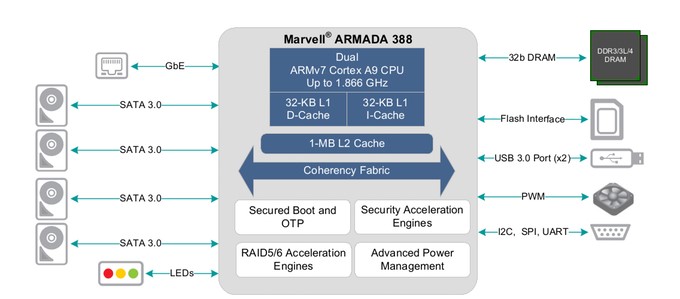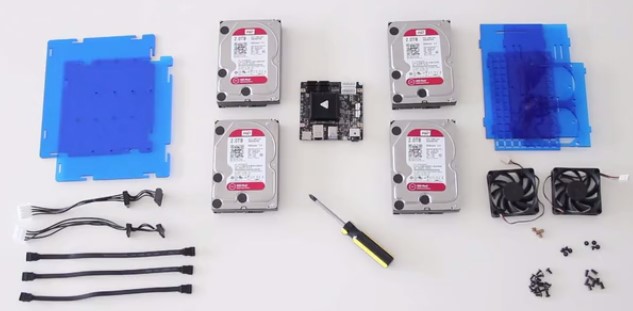- PRODUCTS
- COMPANY
- SUPPORT
- PRODUCTS
- BY TYPE
- BY MARKET
- COMPANY
- SUPPORT
Marvell Technology Instrumental in Ground-Breaking New Open Source NAS Solution
The quantity of data storage that each individual now expects to be able to have access to has ramped up dramatically over the course of the last few years. This has been predominantly fueled by society’s ravenous hunger for various forms of multimedia entertainment and more immersive gaming, plus our growing obsession with taking photos or videos of all manner of things that we experience during an average day.
The emergence of the ‘connected home’ phenomenon, along with greater use of wearable technology and the enhanced functionality being incorporated into each new generation of smartphone handset have all contributed to our increasingly data oriented lives. As a result each of us is generating, downloading and transferring larger amounts of data-heavy content than would have been even conceivable a relatively short while in the past. For example, market research firm InfoTrends has estimated that consumers worldwide will be responsible for taking over 1.2 trillion new photos during 2017 (that is more than double the figure from 5 years ago). Furthermore, there are certainly no indications that the dynamics that are driving this will weaken and everything will start to slow down. On the contrary, it is likely that the pace will only continue to accelerate.
If individuals are to keep on amassing personal data at current rates, then it is clear that they will need access to a new form of flexible storage solution that is up to the job. In a report compiled by industry analysts at Technavio, the global consumer network attached storage (NAS) market
is predicted to grow accordingly - witnessing an impressive 11% compound annual growth between now and the end of this decade.
Though, it must be acknowledged, that we are shifting an increasing proportion of our overall data storage needs to the cloud, the synching of large media files for use in the home environments can often prove to be impractical, because of latency issues arising. Also there are serious security issues associated with relying on cloud-based storage when it comes to keeping certain personal data and these need to be given due consideration.
Start-up company Kobol has recently initiated a crowdfunding campaign to garner financial backing for its Helios4 offering. The first of its kind - this is an open source, open hardware NAS solution that will allow the storing and sharing of music, photos and movies through connection to the user’s home network. It presents consumers with a secure, flexible and rapidly accessible data storage reserve with a capacity of up to 40 TeraBytes (which equates to around 700,000 hours of music, 20,000 hours of movies or 12 million photos).
Helios4 has small dimensions. Built-in RAID redundancy is included in order for ongoing reliability to be assured. This means that even if one of the 4 hard drives (each delivering 10 TeraBytes) were to crash, the user’s content would remain safely stored, as the data is mirrored onto another of its drives. The result is a compact, cost effective and energy saving storage solution, which acts like a ‘personal cloud’.
 Figure 1: Schematic showing the interface structure of Helios4 powered by ARMADA
Figure 1: Schematic showing the interface structure of Helios4 powered by ARMADA
388 SoC
Figure 2: The component parts that make up the Helios4 kit
Inspired by the open hardware, collaborative philosophy, Helios4 can be supplied as a simple to assemble kit that engineers can then assemble themselves. Otherwise, for those with less engineering experience it comes as a straightforward to use out-of-the-box solution. It offers a high degree of flexibility and a broad array of different connectivity options.
At the heart of the Helios4’s design is a sophisticated ARMADA 388 32-bit ARM-based system-on-chip (SoC) from Marvell, which combines high performance benchmarks with power frugal operation. Based on 28nm node, low power semiconductor technology, its dual-core ARM Cortex-A9 processing resource is capable of running at speeds of up to 1.8 GHz. USB 3.0 SuperSpeed and SATA 3.0 ports are included so that elevated connectivity levels can be supported. Cryptographic mechanisms are also integrated to maintain superior system security.
By clicking on the following link you can learn more about the Helios4 Kickstarter campaign. For those interested in getting involved, the deadline to make a contribution is 19th June.
Recent Posts
- The Golden Cable Initiative: Enabling the Cable Partner Ecosystem at Hyperscale Speed
- Marvell Named to America’s Best Midsize Employers 2026 Ranking
- Ripple Effects: Why Water Risk Is the Next Major Business Challenge for the Semiconductor Industry
- Boosting AI with CXL Part III: Faster Time-to-First-Token
- Marvell Wins Interconnect Product of the Year for Ara 3nm 1.6T PAM4 DSP
Archives
Categories
- 5G (10)
- AI (52)
- Cloud (24)
- Coherent DSP (12)
- Company News (108)
- Custom Silicon Solutions (11)
- Data Center (77)
- Data Processing Units (21)
- Enterprise (24)
- ESG (12)
- Ethernet Adapters and Controllers (11)
- Ethernet PHYs (3)
- Ethernet Switching (41)
- Fibre Channel (10)
- Marvell Government Solutions (2)
- Networking (46)
- Optical Modules (20)
- Security (6)
- Server Connectivity (37)
- SSD Controllers (6)
- Storage (23)
- Storage Accelerators (4)
- What Makes Marvell (48)
Copyright © 2026 Marvell, All rights reserved.
- Terms of Use
- Privacy Policy
- Contact


